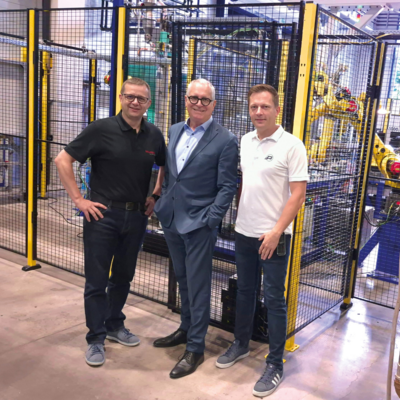News
Pollmann Launches New Tech-Day Format
More
Home Popular

Innovation Popular

Compliance Popular

Realization Popular

Trainee Program Popular

Prototypes Popular

Advanced Product Quality Engineer Full-time

Pollmann Launches New Tech-Day Format 15. December 2025

Pollmann & MAXXOM at IAA MOBILITY 2025 27. August 2025

Pollmann presents initial review of the Vitis relocation 21. August 2025

Matthias Haider Takes Over as CFO at Pollmann International 24. July 2025

Pollmann is once again a “Leading Employer” 28. April 2025

Pollmann optimizes European production footprint 03. April 2025
Energy revolution means electrification. The formula is tempting, but incomplete. After all, electric drives alone will hardly achieve the Paris climate targets. Synthetic fuels could offer a complement, but remain controversial. A review.
Energy efficiency - this argument has always been in support of electric drives. The range, however, which is now getting better and better, is against it. And the weight. Even though Elon Musk claims that his electric truck is almost ready for series production, many representatives of the industry are convinced that the concept will not work in long-distance transport. To guarantee the kind of range that is common in long-distance transport, the battery would have to be so heavy that there would be hardly any room left to load the truck with goods.
For long-haul travel at least, there will be no alternative to climate-neutral synthetic fuels, i.e., fuels produced with renewable energy. "For heavy-load traffic on the road and long-distance aircraft, synthetic fuels seem to have no alternative so far," confirms Martin Robinius, head of department at the Institute for Energy and Climate Research at Forschungszentrum Jülich.
But the last word has not yet been spoken on the use of hydrogen in passenger cars. Of course, the 44,500 electric cars currently registered in Austria are compared with just 45 that are powered by hydrogen - and the majority of these are owned by research institutions. So the market and the consumer seem to have already made a clear decision. But alternative drives, whether electric or in the form of synthetic fuels, are still a niche product. Just one percent of the passenger cars registered in Austria are powered by them. If hybrid cars are also included, the percentage is not quite three percent.
Back-up for electricity
This will change in future. And then synthetic fuels could also play an important role in passenger cars. Not necessarily as the primary fuel, but as an energy source for range extenders. Their function will change radically in the future. While today they are often used to bridge a lack of range and charging infrastructure on some long-distance journeys, in the future they will increasingly become pure back-up systems for cars that basically operate fully electrically. "In the future, the share of non-electric driving in hybrids will be a very small proportion of annual consumption," says Norman Gerhardt of the Fraunhofer Institute for Wind Energy Systems. This small share could then be covered by synthetic fuels produced in an environmentally friendly way using wind energy, for example.
However, the promotion of various power-to-X strategies, i.e. the conversion of green electricity into storable synthetic energy sources, is controversial. Whether hydrogen is used in fuel cell cars or processed into gas or synthetic gasoline or diesel: none of these technologies can match the energy efficiency of direct electric drives. According to the German Federal Environment Agency (UBA), a battery-powered electric car achieves an average of around 0.8 kWh output from 1 kWh input, while the figure for hydrogen-powered fuel cell cars is only 0.65 kWh and for synthetic diesel only 0.5 kWh. In other words: When hydrogen is used, a third of the energy is already lost in the production and refueling process; with synthetic diesel, half is lost.
Lock-in or not?
If hydrogen infrastructure in the form of production capacities and filling stations is now built up, as is gradually happening in Germany and Austria, there is a danger of locking in a technology that is clearly the second choice in terms of environmental policy, opponents of synthetic fuels fear.
Michael Sterner, Professor of Energy Storage at the Technical University of Regensburg, doesn't see the danger of such a lock-in in a wrong technology. In order to achieve the Paris climate targets, industry will definitely need hydrogen as an energy source for many processes. Therefore, he says, it is necessary to build up corresponding production capacities as quickly as possible anyway. "Without hydrogen and power-to-X, the climate targets in industry cannot be achieved," says Sterner.
Austria's politics now seem to be following this. "Hydrogen can become a building block for climate neutrality. Our industry needs hydrogen, and it will get it," Environment Minister Leonore Gewessler stated back in the summer. In the national hydrogen strategy that will be published this year, green hydrogen will reportedly be defined not only as an important alternative energy for industry, but also for heavy-duty transport.
Share this article
We'll be glad to answer your questions:

We'll be glad to answer your questions:

Ms.
Jasmin Schön
Marketing & Communication
Pollmann International GmbH
Raabser Straße 1
3822 Karlstein / Thaya
Austria